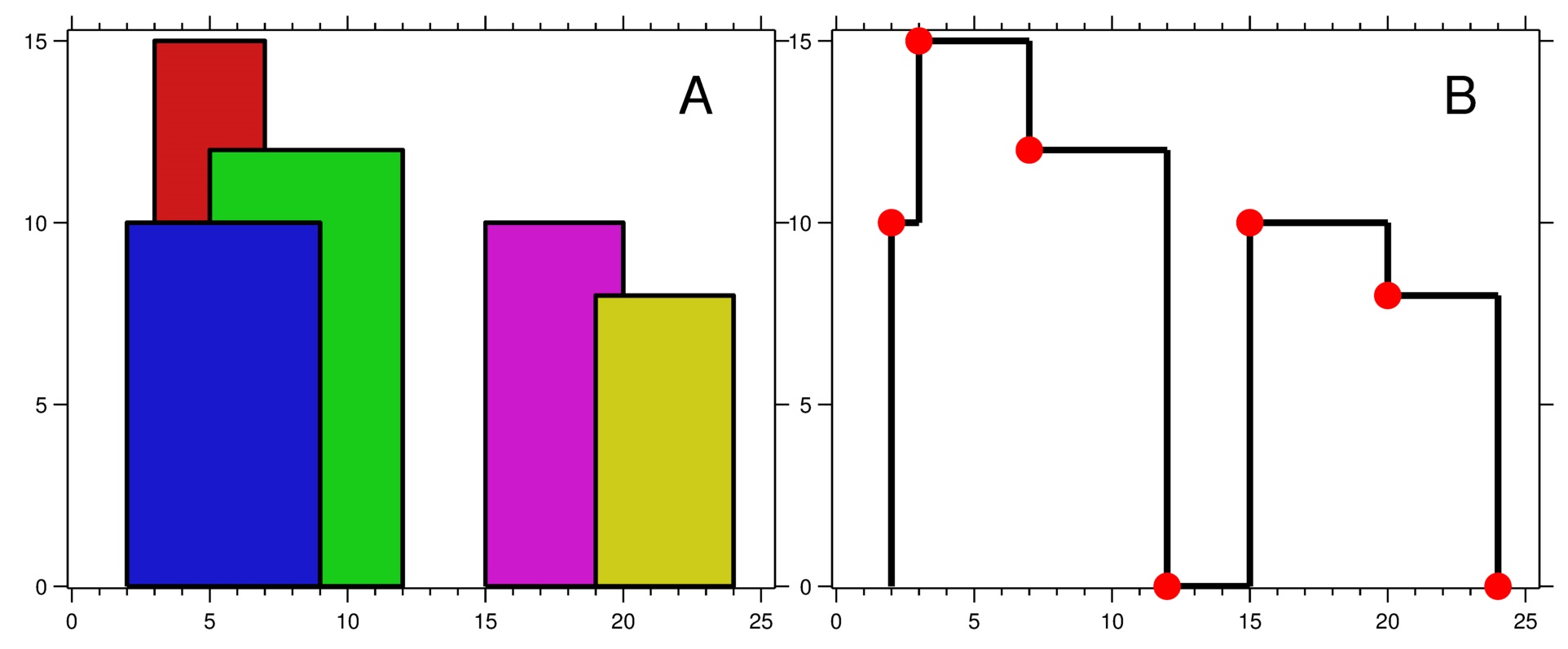Description
A city’s skyline is the outer contour of the silhouette formed by all the buildings in that city when viewed from a distance. Given the locations and heights of all the buildings, return the skyline formed by these buildings collectively.
The geometric information of each building is given in the array buildings where buildings[i] = [lefti, righti, heighti]:
leftiis the x coordinate of the left edge of theithbuilding.rightiis the x coordinate of the right edge of theithbuilding.heightiis the height of theithbuilding.
You may assume all buildings are perfect rectangles grounded on an absolutely flat surface at height 0.
The skyline should be represented as a list of “key points” sorted by their x-coordinate in the form [[x1,y1],[x2,y2],...]. Each key point is the left endpoint of some horizontal segment in the skyline except the last point in the list, which always has a y-coordinate 0 and is used to mark the skyline’s termination where the rightmost building ends. Any ground between the leftmost and rightmost buildings should be part of the skyline’s contour.
Note: There must be no consecutive horizontal lines of equal height in the output skyline. For instance, [...,[2 3],[4 5],[7 5],[11 5],[12 7],...] is not acceptable; the three lines of height 5 should be merged into one in the final output as such: [...,[2 3],[4 5],[12 7],...]
Example 1:

Input: buildings = [[2,9,10],[3,7,15],[5,12,12],[15,20,10],[19,24,8]] Output: [[2,10],[3,15],[7,12],[12,0],[15,10],[20,8],[24,0]] Explanation: Figure A shows the buildings of the input. Figure B shows the skyline formed by those buildings. The red points in figure B represent the key points in the output list.
Example 2:
Input: buildings = [[0,2,3],[2,5,3]] Output: [[0,3],[5,0]]
Constraints:
1 <= buildings.length <= 1040 <= lefti < righti <= 231 - 11 <= heighti <= 231 - 1buildingsis sorted byleftiin non-decreasing order.
Code
Time Complexity: , Space Complexity:
// negative → start event // positive → end event
之所以這樣設定,是因為 sorting 小的在前面,如果 end event 先的話,會造成不必要的斷點,以 buildings = [[0,2,3],[2,5,3]] 為例,若 end event 排在前,就會造成 [[0,3],[2,0],[2,3],[5,0]] 的 output,但其實應該是 [[0,3],[5,0]] 才對。
class Solution {
public:
vector<vector<int>> getSkyline(vector<vector<int>>& buildings) {
vector<vector<int>> events;
for(auto& b: buildings) {
int start = b[0];
int end = b[1];
int h = b[2];
events.push_back({start, -h});
events.push_back({end, h});
}
sort(events.begin(), events.end());
multiset<int, greater<int>> max_heap;
vector<vector<int>> res;
int skyline = 0;
for(auto& event: events) {
int t = event[0];
int h = event[1];
if(h < 0) {
max_heap.insert(-h);
} else {
max_heap.erase(max_heap.find(h));
}
int curMax = *max_heap.begin();
if(curMax != skyline) {
skyline = curMax;
res.push_back({t, skyline});
}
}
return res;
}
};